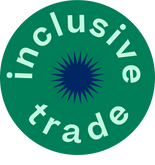World Cotton Day: From Field to Fabric and Beyond
Inclusive Trade is helping delegates celebrate the first World Cotton Day in Geneva with the creation of a custom cotton tote bag that embodies sustainability and accountability.
Inclusive Trade provides an ethical end-to-end sourcing service, which includes design, production and shipping, and when we were asked to produce 500 bags for the delegates at World Cotton Day in Geneva on October 7th, it was an opportunity to show how sustainable business can work in practice ‚ and take cotton‚ from field to fabric and beyond‚ in a transparent and ethical way.
We worked on the basis of a sustainable end-to-end process that began with the design of the bags. Founder and CEO of Inclusive Trade Rupa says, "We wanted to design a bag that was attractive enough for people to want to use over an over again, otherwise it just becomes another throwaway object."
We designed the bags at our studio in London, creating an abstracted design based on the cotton flower, which would both commemorate the event and have an aesthetic that will stand the test of time.

Production was then organised in India through a long-standing collaborator based in New Delhi‚ Shruti Malik, a fashion industry professional with over 16 years of experience.
Shruti says, "Working on this project for the World Cotton Day struck a cord with me instantly. It couldn't be more relevant to the times we are living in. The textile industry deeply impacts mankind and bears the ownership making a huge difference environmentally, economically and socially."
She adds, "The utmost care has been taken to deliver a product that has no detrimental impact on the environment, through reduced wastage and optimum use of resources."

Rupa and Shruti collaborated on production, with Shruti overseeing the manufacturing process on the ground in India. She worked with the GOTS (Global Organic Textiles Standard) certified manufacturer to ensure that health and safety standards for the workers were met, as well all other ethical criteria.
The bags were fabricated in washed, unbleached organic cotton and then screen printed by hand using azo-free dyes. They were then finished with a recycled paper tag and cotton twine before being packaged in bags made from recycled plastic and shipped straight to Switzerland ahead of the event.
